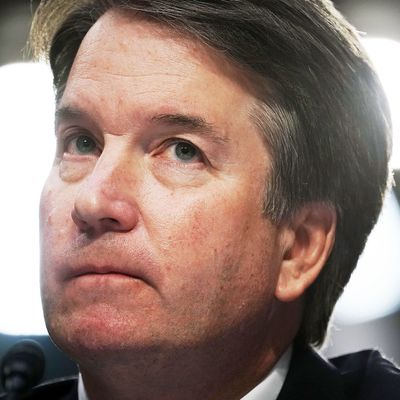
Ed Whelan is not a detective — but on Thursday, he decided to play one on Twitter.
Yesterday afternoon, the prominent D.C. conservative captured the attention of reporters (and, almost certainly, a few personal-injury lawyers) by tweeting an elaborate, alternative theory of who sexually assaulted Christine Blasey Ford at a high-school party three decades ago.
Citing a Google map of the area where Ford, Kavanaugh, and other alleged witnesses lived as children; real-estate photos of a home in the general vicinity of where Ford remembers her assault taking place; and yearbook photos of a man with the same white skin, preppy attire, and bad ’80s haircut that Brett Kavanaugh wore in high school, Whelan suggested that he had found the real rapist — and chose to publicly identify the individual, by name, to tens of thousands of Twitter followers.
Less than 24 hours later, Whelan now believes that, in hindsight, this wasn’t a great idea.
“I made an appalling and inexcusable mistake of judgment in posting the tweet thread in a way that identified Kavanaugh’s Georgetown Prep classmate,” Whelan tweeted Friday morning. “I take full responsibility for that mistake, and I deeply apologize for it. I realize that does not undo the mistake.”
Whelan’s mistake was certainly appalling. But whether he deserves “full responsibility” for it remains unclear. Whelan isn’t some random, right-wing Twitter personality. He’s a former clerk to Antonin Scalia, current close friend of Kavanaugh, and an adviser to the judge’s confirmation effort. What’s more, he is far from the only prominent Republican who has floated the “mistaken identity” theory in recent days (even if he is the only one to render it in such defamatory detail). Earlier this week, Yahoo News reported that Kavanaugh himself had told Republican senator Orrin Hatch that “he was not at a party like the one Christine Blasey Ford described and that Dr. Ford ‘may be mistaking him for someone else.’” One day before sharing the findings of his “investigation” with the world, Whelan tweeted the Yahoo News scoop.
Meanwhile, the Washington Post reported that “Kavanaugh and his allies have been privately discussing a defense that would not question whether an incident involving Ford happened, but instead would raise doubts that the attacker was Kavanaugh, according to a person familiar with the discussions.”
And a wide array of conservative commentators and publications discussed such a defense publicly over the past week. On Monday, a Wall Street Journal editorial suggested that Ford’s allegation might be a case of “[m]istaken identity.” The conservative Washington Post columnist Kathleen Parker devoted an entire op-ed to that premise. Then, on Wednesday, one of Hatch’s top aides, Matt Whitlock, quoted a tweet from Whelan, and instructed his followers to “Keep an eye Ed’s tweets the next few days.” On Thursday night, after Whelan’s sleuthing was met with bipartisan condemnation, Whitlock deleted the tweet.
Ford, for her part, poured cold water on the theory Thursday night. “I knew them both, and socialized with” them, she said of Kavanaugh and his classmate, “there is zero chance that I would confuse them.”
It isn’t hard to understand why Kavanaugh and his allies would find the dopplegänger theory appealing. It allows Republicans to evade the unseemly task of accusing a self-identified sexual-assault victim of being an outright fabulist, while nevertheless preserving Kavanaugh’s innocence. But it is difficult to comprehend what would have led Whelan — who, as a lawyer, is ostensibly familiar with the concept of libel — to publish an ill-substantiated sexual-assault allegation that not only puts himself at legal risk, but also bolsters Democrats’ demands for both an FBI investigation of the incident, and for subpoenaing potential witnesses other than Kavanaugh and Ford. What’s more, the widespread reports of Kavanaugh’s involvement in generating the mistaken identity theory leave the Supreme Court nominee vulnerable to the charge that he was a co-conspirator in Whelan’s defamatory tweets — a possibility that Senate Democrats now intend to explore at next week’s hearing.
Making matters even more baffling, Whelan’s tweetstorm was ostensibly written before Ford reiterated her intention to testify — which is to say, when it still looked like Kavanaugh would be able to sail to confirmation without ever having to elaborate on his categorical denial of Ford’s claims.
All of which prompts the questions: Would Whelan really have done something so audacious and risky without first seeking the approval of the confirmation campaign that he was advising? Would Orrin Hatch’s aide advertise an impending tweetstorm from Whelan if he was not in the know? And if Hatch’s office did have (at least) a general understanding of what Whelan had planned, is it really possible that Kavanaugh didn’t?
A horrific series of tweets certainly occurred. But those looking to assign primary responsibility for the incident just might have the wrong guy.






























